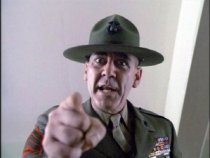 In November, Harvard Business Review‘s spotlight is on “Leadership Lessons from the Military.” It’s up already and is a great little resource if you’re looking for how military leadership can apply to other sectors. Some of the comments, however, are fascinating. From their responses, you’d think people actually believe movies like “Full Metal Jacket” and “Platoon” are accurate documentaries on life and leadership in the US Armed Forces today.
In November, Harvard Business Review‘s spotlight is on “Leadership Lessons from the Military.” It’s up already and is a great little resource if you’re looking for how military leadership can apply to other sectors. Some of the comments, however, are fascinating. From their responses, you’d think people actually believe movies like “Full Metal Jacket” and “Platoon” are accurate documentaries on life and leadership in the US Armed Forces today.
I actually run into this quite often. Year after year the military rates far above every other sector in the National Leadership Index (an annual study on confidence in leadership conducted by the Center for Public Leadership), but many people don’t understand how these leaders are developed. Here are the three most common myths I encounter:
Myth #1: Soldiers are trained to be mindless automatons. Actually, just the opposite is true. Initiative is driven into junior leaders from day one. Lieutenants and Sergeants are trained to think on their feet and react to reality – without direct orders. The most important part of any military plan is the “Commander’s Intent.” It’s a concise description of what the commander wants to achieve and how he or she would like to achieve it. Five minutes after the bullets start flying, everything in a plan can (and often is) rendered obsolete – everything except the Commander’s Intent. That’s the one thing you can cling to while you improvise a practical solution.
Myth #2: The military uses fear to motivate people. True, you’ll find plenty of fear in military training, but it’s primarily injected into situations to help soldiers learn how to deal with it. Fear is a reality of battle – and life. The ability to overcome your fears and perform under pressure is essential to succeeding in combat (and anything else in life). It’s also the foundation of a little thing called courage. And a bit of courage goes a long way as a leader.
Myth #3: The military cares more about their mission than their people. “Mission first; people always.” That’s the mantra that’s lived in the military. Without the mission the organization wouldn’t exist, but without the people the organization can’t accomplish it’s mission. As a Company Commander if one of my soldiers missed morning formation, we’d go looking for them – not to punish them, but to make sure they were alright. As leaders we made it our business to know our soldiers, their families, and their dreams – what made them tick. We made ourselves responsible for them.
How do you think military leadership does or doesn’t apply to other endeavors?
- Click to share on X (Opens in new window) X
- Click to share on Facebook (Opens in new window) Facebook
- Click to share on LinkedIn (Opens in new window) LinkedIn
- Click to share on Reddit (Opens in new window) Reddit
- Click to email a link to a friend (Opens in new window) Email
- Click to print (Opens in new window) Print